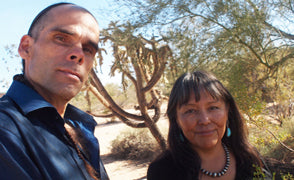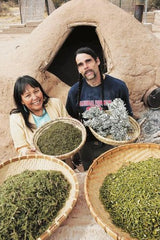Medicine of the People Evolving Along its Natural Path
By Gale Courey Toensing
Story Published: Jul 20, 2009
Story Updated: Jul 17, 2009
MARANA, Az. – Virginia Boone and Leonard Marcus are in the fortunate position of living lives in which work, family, social life, health, spirituality, tradition and culture meld together into an integrated, meaningful whole. Life and business partners for the last 15 years, the couple collects wild herbs and other plants in areas of the southwestern states of Arizona, New Mexico and Colorado, crafts them into handmade traditional Navajo herbal remedies and sells them at pow wows, Indian markets, conferences and on the Internet . It’s a way of life to which Boone and Marcus are profoundly committed.
 “The commitment comes from the understanding that we have a connection with the earth and that is how all Native Americans relate their way of life – by working the earth and being committed to using the spirit of the body and the earth to live, you know?” Boone said. “It keeps the culture alive and it helps people. It’s not just one thing or the other; it’s a whole thing in itself. We’re fortunate that it’s something we can do to help people and share with a lot of people.”
“The commitment comes from the understanding that we have a connection with the earth and that is how all Native Americans relate their way of life – by working the earth and being committed to using the spirit of the body and the earth to live, you know?” Boone said. “It keeps the culture alive and it helps people. It’s not just one thing or the other; it’s a whole thing in itself. We’re fortunate that it’s something we can do to help people and share with a lot of people.”
Boone, Navajo, was born near Flagstaff, Ariz., and gained her herbal knowledge from her father, who was raised in the traditional Navajo way, learning the healing crafts from his aunt when he was a child. He later studied under eight other Navajo herbalists gaining knowledge of more than 200 plants and becoming a renowned herbalist himself for 20 years.
“He taught my brothers and sisters and me when we were young, taking us with him to gather plants. We learned to give corn pollen as an offering to the plants and talk to them in a sacred manner. He taught us to be aware of the plant’s energies and that, like people, they each are different and that they possess powerful healing and spiritual qualities.”
Boone continues to learn the healing arts from her 87-year-old aunt, her father’s only living sister. “She has really helped me a lot the last couple of years to keep moving and learning this medicine directly from her in an oral tradition, and that it’s important for other Native people to be inspired by what we do so they can go back to their grandparents or parents and ask these questions. It’s just another way of keeping the culture alive and keeping people aware that the things that keep happening to our earth can’t keep going on, because we do have to survive and it’s important for people to know that this is not just for Native Americans, and it’s not just a matter of marketing the green thing. It’s our belief, our way of life.”
Boone has given each of the salves, balm, teas, oils and creams she produces a Navajo name that states its function. A natural diet tea, for example, is called Tsa halts’aa’i, which mean skinny or thin tea. A salve that’s efficacious in reducing the pain, swelling and itching of insect bites is called Na’ash, Jeeh ii Ch’il, which means spider in Navajo. The ingredients and descriptions of the healing powers of each of the 35 products and ordering information is available on the Web site. Yellow Root Tea, for example, is good for cleansing the liver, kidney, spleen and body organs; Greasewood Cream helps dry, cracked skin, rash and symptoms of eczema and psoriasis.
When Boone first started the business, she sold only the dried herbs she collected, but as time went on people began asking about salves and lotions and other products. “So we had to go and research how to make these products, and the business just grew from those demands of our customers.”
All aspects of production, including pasting labels on tins and sealing them currently take place in a room in the couple’s house in the Sonoran Desert, about 30 miles from Tucson. Virgina Boone is seen here with her 87-year-old aunt, who she continues to learn traditional Navajo medicine from. The couple has not tried deliberately to grow the business, but instead have responded to what they perceive as the business’s organic growth.
miles from Tucson. Virgina Boone is seen here with her 87-year-old aunt, who she continues to learn traditional Navajo medicine from. The couple has not tried deliberately to grow the business, but instead have responded to what they perceive as the business’s organic growth.
“We’re slowly growing with the demand. We’re not trying to put a big manufacturing facility out there or do anything other than growing as the people demand from us, which is always the way it has grown,” Boone said. But the demands of the market are forcing a decision and Medicine of the People is now at a point where expansion is almost unavoidable. The two-person business with part-time help from a single, trusted employee must either grow or remain static. Recently, the company began to wholesale its products.
“For a long time Virginia was adamant that she wouldn’t wholesale. She would protect the medicine with every part of herself and I always went along with that because it’s her family’s medicine, not mine,” said Marcus, whose background is Pottawattamie.
Under the current circumstances, the company is considering conversion to nonprofit status. “That would let us allow in a few people that we trust who have abilities that complement what we’re doing and it would allow us not to sell out to a big corporation, which we never would do anyway, even if they offered us $100 million right now,” Marcus said.
He said they are not against money and technology, if used correctly, but they are more conscious of “where things need to go to fix the earth” and more committed to pursuing that goal than chasing the big bucks.
“We have a really strong belief in the Creator and that there’s a meaning and a story and a bigger picture to this whole thing, and that we’re participating in it. And if our company and we as individuals can be a force in helping, that’s all to the good. We really feel the medicine has given us the form it wanted to go out in.
- Leonard Marcus


